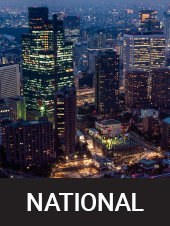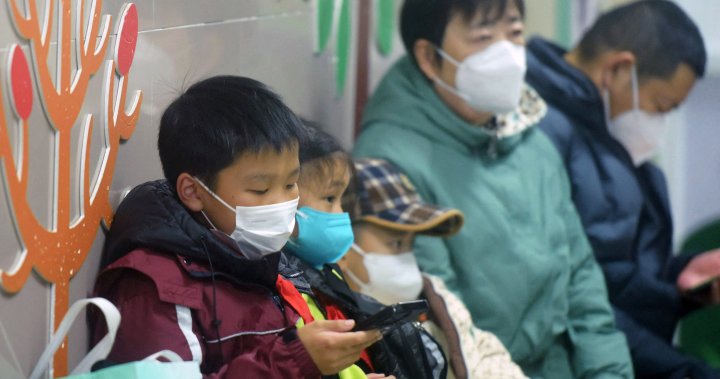Canadian Michael Kovrig and his girlfriend were walking home from dinner on Dec. 10, 2018.
They lived in Beijing, where Kovrig, a former diplomat, worked at an independent global think tank. As they took the final steps into their apartment, they were swarmed.
“I was grabbed out of the blue by about a dozen men in black. They stuffed me into a car and took me to a secret black jail and then proceeded to interrogate me relentlessly and hold me in solitary confinement,” he told Global News, sharing his story of incarceration and the aftermath.
The sit-down interview comes three years after he was released following 1,019 days in a Chinese detention cell. Kovrig is now sharing his story for the first time, including details of his two-and-a-half-year incarceration and meeting his daughter following his release.
He spoke of finding strength from the letters and cards he received from ordinary Canadians, and he warned Canada and its allies about the need to take foreign interference seriously.
“It’s the confinement and the isolation that are really psychologically, brutally difficult, coupled with an interrogation approach that is really just designed not to extract information because it was obvious from the beginning that they were just looking for something that they could use,” Kovrig said.
“They were trying to crush my spirit and gaslight me and brainwash me into accepting their narrative and confessing to crimes that I’d never committed.”

The ‘Two Michaels’ became known internationally following their arrests by Beijing in 2018 on widely condemned Chinese claims of espionage.
The Canadian government said Kovrig and Spavor were political pawns, arbitrarily detained in response to the arrest of Chinese tech executive Meng Wanzhou in Vancouver at the request of the United States.
The Chinese courts convicted both men on the widely condemned charges in separate trials but after nearly three years, Meng’s extradition case was dropped and she was allowed to return to China on Sept. 24, 2021. Michael Kovrig and Michael Spavor were freed hours later.
“It’s been a very busy few years, both getting caught up in terms of work, but most importantly, healing and taking care of my family, reconnecting with my friends, travelling around, finding everyone who worked on that crisis and who helped me get back to freedom and thanking them personally,” Kovrig said.
“People forget when someone is taken hostage or detained or subjected to something like this, it’s not just hard on the detainee, it’s brutally hard on the family who faces all kinds of uncertainty and pain and anguish from that and so my loved ones have also needed a lot of help to recover,” he said.

Kovrig spent months in solitary confinement. He said he leaned on Buddhist philosophy, yoga and strength training exercises to cope with adversity. He said he also sang a lot of Leonard Cohen songs to himself to cut the silence, and often shared song titles and lyrics through letters and consular visits.
“I built a routine for myself … because the most difficult thing when you’re in a situation like that, you’re totally alone,” he said.

Get daily National news
Get the day’s top news, political, economic, and current affairs headlines, delivered to your inbox once a day.
“Sometimes they would leave me alone for three or four days with nobody to talk to, so that at the end of that period you want to talk to your interrogators because you’re just so achingly lonely.”
Becoming a father in prison
While he was in solitary confinement, Kovrig’s partner at the time gave birth to their daughter, Clara.
Becoming a father is what gave him strength and hope during the darkest times.
“I just tried to live moment by moment with the sense that I’m going to come out of here and I’m going to take care of my daughter and nothing is going to stop me,” Kovrig said.
Michael Kovrig and his daughter Clara, who was born after his arrest.
Photo provided
The first time he met Clara, she was already two-and-a-half years old.
“That first meeting with her was one of the most heartwarming moments of my life.”
Kovrig said his number one priority since his release is being a dad and building a relationship with his daughter.
“We bonded immediately and really very, very quickly connected and have a very strong connection now.”
A public inquiry into foreign interference is probing alleged attempts to meddle in Canada’s last two federal elections – and China has been one of the countries at the centre of those allegations.
Kovrig said “not enough was done” to address such threats initially because the threat they pose hadn’t been recognized by many as a problem in Canada.
“We have been, I think, a little too lackadaisical about the possibility of foreign influence and interference because we haven’t really had to deal with it too much before,” he said.
“I think that has a lot to do, more simply with a political elite that are not used to thinking in national security terms and not responding that way.”

Kovrig said Canada needs to do better.
“I think we need to be more rigorous and serious about national security issues in general,” he said.
“We need to be a lot more alert to things like that to make sure that foreign influence and interference are not possible in Canada and that perpetrators are dealt with.”
Prior to his detention and work with the think tank, Kovrig had worked as a diplomat at the Canadian embassy in Beijing from 2014 to 2016.
He then took an unpaid leave to join the International Crisis Group, an independent global think tank.
When asked if he would ever consider going back to China, Kovrig said “it would be difficult to imagine that,” but he hopes to return one day.
“I would be delighted to have the opportunity to eventually go back,” he said.
“I have a great deal of respect and fascination for many aspects of China as a country, its people, the vast majority of whom I always had very good interactions with. I have many friends there. The fantastic food, possibly the best in the world, interesting culture and many other things to visit.”





